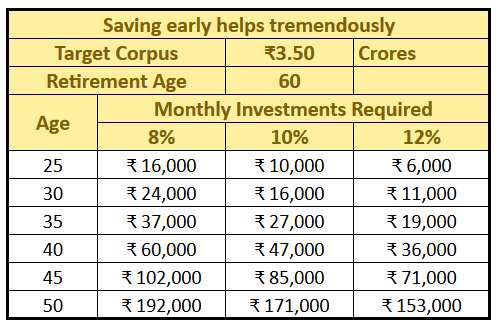The primary requirement is that one should be well funded. Whatever one may want to do, one should be in a position to pursue. And many of the things require money. Travel, for instance, is one of the most common pursuits in retirement. A financial plan is invaluable to ensure a well-funded retirement.
The other aspect that retirees need to contend with is how they will keep themselves engaged. There will be a lot of time on ones hand, in this phase. A typical day in the life of a retiree would be spent in morning walks, reading the newspaper, household work, siesta, watching TV, listening to music etc. Even accounting for all these, there will still be a lot of time on ones hands. It is important to figure out how one will spend time as much as having a robust financial plan.
Setting up an income in retirement
The first thing to do is to estimate the expenses in the retirement phase. This is not as easy as it first appears. For instance, someone who has turned forty spending Rs.65,000 per month would not anticipate that their expenses would be about Rs. 1.6 Lakhs in the first year of retirement considering an inflation rate of 7% p.a. throughout the period, even assuming that children related expenses are weeded out!.
The effect of inflation is ignored by most. That is one of the reasons that people dont appreciate that they need to accumulate a huge corpus at retirement.
Once the expenses are known & the life estimation is done, the amount needed at retirement can be arrived at. This becomes the target amount to be achieved when one retires (typically at 60).
A stable income in the retirement phase is critical. This can be done through Senior Citizen Savings Scheme, Pradhan Mantri Vaya Vandana Yojana, Bank & corporate FDs, Bonds & NCDs etc.
Besides this, one can also set up a regular income through Systematic Withdrawal after investing in Debt MF schemes. For those in the upper tax brackets, this works out to be more tax efficient.
When does one start planning for retirement?
Retirement is a very long-term goal and a very important one at that. Also, this is a goal that takes a lot of money. Since this goal is far into the future, many times people dont even think of this goal earlier on in life. But that would be a mistake.
Saving early helps. The power of compounding over a very long period acts as a tailwind, helping in getting a gargantuan corpus even if ones investment during the entire period is rather modest.
If one wants to get to a target corpus of Rs.3.5 Crores by 60, a saving of Rs.10,000 pm from age 25 till retirement is good enough (assuming a 10% pa return). Just Rs.10,000!
If the same person were to wake up to the need for retirement saving at 35, the monthly savings needed is Rs.27,000 (assuming a 10% pa return) which is somewhat under three times what was necessary at 25!
Look at the table below for an eye-opening insight.

Also read: Retiring early may not be such a great idea
What are the considerations while choosing investments for a retiree?
Someone in the retirement phase would be interested in getting a regular income.
They would also be keen on capital protection, considering the fact that any capital erosion cannot be made good by again going back to work.
They may want to ensure that money is available for various goals they may have in the future travel, gifting, medical needs etc.
Most retirees want to leave a legacy for their children & grandchildren. Many of them also have philanthropic intentions which they want to do in their lifetime.
People now live longer in retirement. It is important that their corpus lasts their entire lifetime. Living too long was never considered a problem before now, it can be!
The product chosen hence should be a good mix of products that offer the right mix of the following
- Regular income
- Safety
- Liquidity
- Taxation
- Long tenured
- Investments
- Growth
- Diversification
Also read: Approach to take for a well-funded retirement & Avoid these mistakes to ensure a well-funded retirement
Stable Income
For setting up a stable income there are many options. Senior Citizens Savings Scheme, Pradhan Mantri Vaya Vandana Yojana, Post Office Monthly Income Scheme are offered by Government agencies and are quite popular with retirees.
Bank & Corporate FDs, NCDs & Bonds are also fixed income instruments that provide regular income are others that are useful for them.
Tax Efficient Products
Tax-free bonds are a good way to invest for those in the higher tax brackets. One can also invest in Debt MFs & setup Systematic Withdrawal to ensure regular income. This would be tax efficient due to the capital gains tax treatment.
Fixed Maturity Plans ( FMPs ) are close-ended products. Those which have a maturity of three years or more will enjoy long-term capital gains treatment and the effective tax rate would be in single digits. The other product that is very tax efficient is PPF. If no near-term liquidity is needed and one wants to keep the money invested for a future period, PPF can be a great investment option too.
Growth
If growth is on ones mind & want the corpus to last long, then equity-oriented investments are suggested. Equity-oriented Mutual Funds or investments in direct Equity will help one to grow at a pace greater than inflation. This will be essential if the corpus has to last long. There will be volatility in such a portfolio, but over time delivers good results.
Also read: Realigning investments after you retire
Would rental income be a good choice for Retirees?
Many retirees also depend on rental income for their regular income. However, rental income has several shortcomings
- Rental yield is low in most places in India. On a gross basis, it may be about 3% ( of current property value ) for Residential homes and 4-8% ( of current property value ) for commercial properties. The net realisation after society charges, property taxes & Income tax would be less than 2% for residences and 2.5% to 5% for Commercial properties.
- There are periods of vacancy, where there would not be any income.
- There could be other expenses like brokerage, repairs, and maintenance within the premises, contribution to major repair expenses in the building etc., which depress the returns further.
- There can be hassles related to collecting rent like defaults in rent payment, not vacating premises after the tenure leading to litigation etc.
Due to these considerations, we do not suggest that retirees rely on real estate to generate a stable income in retirement.
What about Pension plans as a retirement planning tool?
Pension plans are thought to be a great way to ensure a well-funded retirement. However, that assumption is not really true.
Let us see why.
- Pension plan annuities ( pensions ) are taxable & are hence added to ones income. This is hence not such a desirable way to set up an income, especially when the income from multiple sources can pitchfork one into the higher tax brackets.
- Once the pension plan vests & the annuity starts, the corpus gets locked up and is not accessible throughout ones lifetime. It is available to the nominee after ones lifetime. Due to this, if there is an emergency requirement for money, this corpus cannot be accessed. Flexibility is hence lost.
- Pension funds usually offer low returns. If it is a unit-linked product, however, it can offer market linked returns.
Retirement funding is important and there are multiple ways to do it. It is wrongly thought that pension products are somehow the one most suited for retirement probably due to the word pension!
Also read: Buying retirement plans is not retirement planning
How do I know how much is needed in retirement & how to accumulate it?
It is indeed important to know how much is needed in the retirement phase. Only if we know that can we start saving towards that goal? This was touched upon earlier but is explained in detail in this section.
One can follow the following steps to get to the required corpus:
- What are the expenses that may be there in the first year of retirement? To get to know that, one should exclude expenses of today which will not be there in the future. One such expense is Childrens education expense. After, reducing such expenses, whatever residual expenses are there should be projected to ones retirement age, assuming an inflation figure (say 7%). One then needs to provide for various goals including medical expenses & a survival period (usually 20-30 years). Based on this, one can calculate how much is needed at the start of the retirement period.
- Next, one has to see how one can reach this figure. Some amounts might already be there which are for.
- There may be some savings already earmarked for retirement. There may be some amounts to be saved regularly to reach the desired level of corpus. Whether one saves linearly or one increases the savings over time is something that needs to be decided based on their personal situation.
- Also, one needs to get the mix of assets in the portfolio right. Then, within the asset class, the right instruments need to be chosen after considering the tenure, tax, liquidity, risk and other considerations.
- The portfolio and the allocations need to be monitored and appropriate changes made, from time to time. Even asset allocations would have to change over time.
If all these look difficult, consider a fee-only financial advisor to provide Retirement Planning advice. Only such an advisor can provide reliable advice you can trust.
A little bit of foresight and some bit of prudent savings will ensure that one can have a well-funded retirement and at the same time have enough money for other goals.
Retirement should be a period when one gets to enjoy the fruits of all the good work one has put in. Retirement should be a period when one should be able to enjoy, without getting worked up about finances. In fact, it should be a period when one is able to relax, pursue ones passion, enjoy the peace and calm & enjoy life itself!
Also read: What can one do post-retirement?
Retirement can be the best time of ones life. Only that one should have prepared for retirement with the same diligence one would have prepared for a football game in which one is playing. The prepared team and person wins. Plan well & live a fulfilling life!


